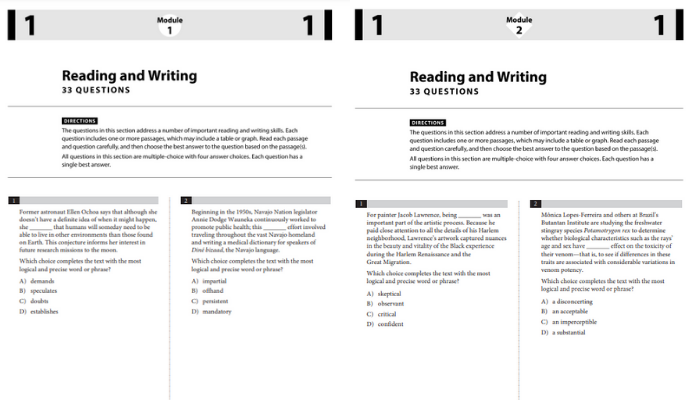The SAT is a significant aspect of most college admissions processes. Schools use it as one factor to determine a student’s college readiness, and it can even assist students to qualify for merit scholarships. The SAT is changing to be more helpful for students and teachers in today's digital world. Starting in 2024, both U.S. and international students will take the SAT on a computer instead of with paper and pencil. This switch means the test will be shorter, taking 2 hours instead of 3, and you'll get your results faster.
Preparing for the SAT can be a big task, and it's okay if you're not sure where to begin. A good starting point is to understand how the test is set up and find ways to adjust your study strategy to do better on each part. So we’ve accumulated some tips and tricks for the SAT English Section to help you work on your score.
Explore the SAT Course Book a Free Trial Session
What’s on the SAT English Section:
The Reading and Writing section contains 2 modules. There are 25 operational questions and 2 pretest questions in each module. The time duration for each module is 32 minutes. You will find the exam structure in detail in the table given below:
| DIGITAL SAT EXAM STRUCTURE | |
| Section | Reading and Writing |
| Test length | Module 1: 25 operational questions and 2 pretest questions Module 2: 25 operational questions and 2 pretest questions |
| Time per module | Module 1: 32 minutes and Module 2: 32 minutes |
| Number of questions | 54 questions |
| Total time | 64 minutes |

Get Exam Prep Help Book a FREE Demo Session
Tips and Tricks for Excelling on the SAT
The SAT is a tough and lengthy exam. Getting ready for it is crucial to do well and get a good score. While it's important to dedicate plenty of time to study beforehand, here are some tips that can help you feel more at ease and confident on test day.
General SAT Tips:
1. Manage Your Time:
– Read the directions before each section to know what to expect.
– This helps you save time and avoid confusion during the test.
2. Start with Easy Questions:
– Tackle the easier questions first to build confidence.
– If a question is taking a while, skip it for now and return to it later.
3. Don't Leave Blank Answers:
– Unlike before, you won't lose points for guessing.
– Always make an educated guess, as a blank answer is considered incorrect.
Evidence-Based Reading Section Tips:
1. Plan Your Strategy:
– Decide if you prefer reading the passage first or looking at questions.
– Choose a strategy that works for you to save time and reduce stress.
2. Mark Up the Passages:
– Circle or underline important information.
– This helps you quickly find key details and answer questions faster.
3. Read the Pre-Passage Description:
– It provides context about the author and writing, aiding your understanding.
– This insight can be valuable in comprehending the passage.
Evidence-Based Writing Tips:
1. Choose Concise Answers:
– Shorter answers are often correct, as clarity matters more than length.
– Avoid being misled by longer, seemingly sophisticated options.
2. Memorize Grammar Rules:
– Focus on grammar rules like subject-verb agreement and punctuation.
– Understanding these rules will boost your confidence and accuracy.
Remember, preparing in advance and adopting effective strategies can make the SAT more manageable. Good luck!
Digital SAT eBook:
It is very important to know minor to major facts when starting your preparation for an aptitude-based exam like the SAT, with updates that can help with your Digital SAT preparation.
We are pleased to announce the release of TestprepKart's free Digital SAT study guide for the new SAT. This free Digital SATebook gives you everything you need to know about the test, from content to content mastery, among the top practice goals you need.
FAQs-
Q: What are some general strategies for tackling SAT English questions?
A: Focus on understanding the passage as a whole, identify key themes, and pay attention to context clues. Prioritize sentence structure and grammar rules.
Q: How important is time management when answering SAT English questions?
A: Time management is crucial. Manage your time effectively to answer all questions. Avoid spending excessive time on one question; if necessary, move on and return later.
Q: Should I read the entire passage before answering the questions?
A: It depends. Skim the passage first to get an overall sense, then focus on specific details as you answer questions. Adjust your approach based on the question types and difficulty.
Q: How can I avoid common traps in SAT English questions?
A: Be wary of answer choices that sound correct but alter the passage's meaning. Pay attention to extreme language and ensure your choice aligns with the passage's tone and context.
Q: Should I guess if I'm unsure about an answer?
A: Yes, there's no penalty for guessing on the SAT. If you're unsure, make an educated guess. Eliminate incorrect choices and choose the option that seems most reasonable.




Leave a Reply